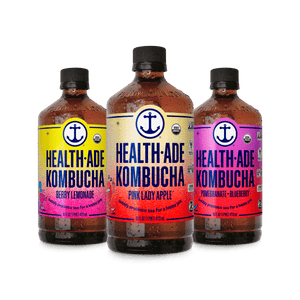
Kombucha | 12 Pack
Fan Favorite Variety Pack
One-time Purchase
49.95

Copied URL to clipboard!
Real talk: feeling bloated is never fun. If you’ve ever experienced that awkward combo of fullness and puffed-up pressure, you’re definitely not alone.
Feeling bloated can make everything from getting dressed to simply going about your day more uncomfortable and frustrating, but here’s the thing: bloating is a totally common, often normal part of digestion. In fact, feeling bloated every now and again is just part of being human!
Nevertheless, understanding why bloating happens and how to support smoother digestion can help you feel more confident, at-ease, and in charge of a happy gut. Let’s dig deeper!
Bloating is the sensation of abdominal fullness, tightness, or distention. This feeling of fullness is often caused by trapped gas, which comes from a variety of factors. Here are the most common ones:
Digestion. Gas is a natural byproduct of food being broken down by your digestive system. This happens especially when fiber-containing foods reach your large intestine. Unlike other food components that are broken down earlier in the digestive tract, fiber reaches your colon mostly intact. The array of microbes living there begin fermenting the fiber, resulting in the production of hydrogen, carbon dioxide, and methane gases. This process feeds all the good bacteria living in your gut, which is one of the many reasons why fiber is such an essential piece of the healthy gut puzzle.
Swallowed air. Talking while eating, eating too quickly, and chewing gum can be actions that introduce extra air into your digestive system. These air pockets can lead to that bloated feeling both during and after meals.
Eating past comfortable fullness. Your stomach is designed to stretch and expand to accommodate different amounts of food throughout the day. But when you consistently eat past the point of comfortable fullness, it can overstretch, leading to belly distention. Add in swallowed air and the natural gases produced during digestion...you’ve got the perfect storm for bloating and discomfort.
Sluggish digestion. If food is moving through you slowly due to stress, a lack of fiber intake, or insufficient hydration, you may experience some bloating related to constipation.
Sugar alcohols. Sugar alcohols are commonly used as sugar substitutes in “sugar free” products. Unlike regular sugar, your body does not fully digest these. They make it to your large intestine and are fermented by gut bacteria there, leading to gas production. Sugar alcohols can also draw water into your colon, which can amplify that bloated feeling and even lead to a laxative effect when consumed in excess. Sugar alcohols impact everyone’s digestion differently, so pay attention to how your body feels after consuming a lot “diet” or “sugar free” products. And if you’re looking for a fun drink that’s low in added sugar and free from sugar alcohols, we got you covered with SunSip!
You get it now: bloating happens, and it’s often a normal part of your gut doing it’s thing. But if you want to do your best to minimize that bloated feeling this summer, here are a few ways to help your body out:
Focus on fiber, gradually. Fiber is essential for a healthy gut, but eating a ton of it at once (especially if you’re not used to it) can pave the way for excess bloating. Start small by adding fruit to your breakfast or a veggie to your dinner. Slowly increase this over time so that eventually you’re including a source of fiber in most of your meals and snacks!
Don’t forget to hydrate. Fiber can’t move smoothly through your digestive tract without water, so be sure to drink enough consistently throughout the day.
Add a bottle to your daily routine. Try adding a bottle of Health-Ade Kombucha to your daily routine! It’s a simple and tasty way to enjoy the benefits of fermented foods like yogurt, kefir, kimchi, and—of course—kombucha. These foods offer beneficial bacteria that can support the health and diversity of your gut microbiome. Some studies suggest that a more balanced microbiome could lead to better management of abdominal bloating and distention, although more research is needed to understand the exact link between gut microbiota and bloating.
Eat mindfully. When possible, slow down your meals! Chew thoroughly, take your time to enjoy the flavors, and avoid chatting while chewing. This will reduce the amount of air you swallow while eating, help you notice fullness cues, and set you up to feel more satisfied after meals!
Explore digestive helpers. Ginger and peppermint can both support and calm your GI tract. Consider incorporating herbal teas or even slowly sipping on some kombucha for digestive support. Our Ginger Lemon flavor makes a great mule mocktail! Gentle movement like stretching or walking can also stimulate digestion and move the gas that causes bloating through your digestive system.
While chronic bloating that’s accompanied by pain or changes in bowl habits should be addressed with your physician, feeling bloated on occasion isn’t always a sign that something is wrong. In fact, it’s often a part of your gut doing its job!
The next time you’re feeling bloated, remember: it’s okay—the discomfort will pass with time. Until then, wear something comfy, try some gentle movements, and sip on something soothing. Most of all, be kind to yourself!
Sources:
1. https://pmc.ncbi.nlm.nih.gov/articles/PMC11357468/